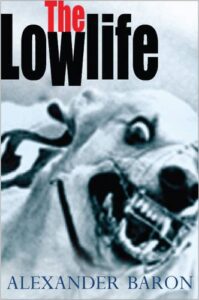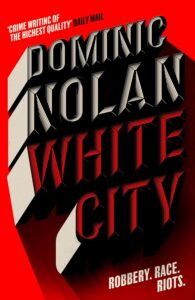I’ve been looking forward to this week for many, many months. If you follow me on Twitter (aka X) you can’t help but have noticed my continued insistence that people should read Dominic Nolan’s excellent Vine Street.
Vine Street utterly blew me when I listened to the audiobook, it was like no story I had read and it put me through an emotional spin cycle. I described it as a serial killer story which spanned several decades. When I saw Dom at Aye Write and also at Bloody Scotland he described Vine Street as a book about the dance halls of Soho in the 1920s. It’s both those things and so much more.
Why have I been looking forward to this week when Vine Street has been on my mind for the last two years? Simply because this week sees the publication of White City, Dominic’s new book and I am actively avoiding all spoilers so I can read it on release this week. The excitment is real people – this is what I blog for, to share my reading highights.
With White City looming into view I asked Dom if he would take on my Decades challenge and add some new books to my Ultimate Library. I was delighted he agreed and I am really excited to share his selections with you.
Before we get to the books I shall quickly recap the Decades Challenge and why these books are being added to my Decades Library:
I am trying to assemble the best collection of unmissable books. In January 2021 I opened the Library with no books on the virtual shelves. I have invited authors, publishers, bloggers and journalists to add their favourite books to my Library shelves so I can ensure visitors to my Decades Library will only have the very best books to choose from. Why is it a Decades Library?
Two rules govern the selection process:
1 – You May Choose Any Five Books
2 – You May Only Choose One Book Per Decade From Five Consecutive Decades
It’s a Decades Library as each book which is added to the Library by my guests must be contained wihin a fifty-year publication span. As you will see, this week’s selections begin in the 1960s. It’s time to let Dom take over – brace your TBR, this is going to challenge your book buying willpower…
 Dominic Nolan lives in London and is the author of the widely acclaimed VINE STREET, AFTER DARK, and PAST LIFE.
Dominic Nolan lives in London and is the author of the widely acclaimed VINE STREET, AFTER DARK, and PAST LIFE.
In WHITE CITY, his fourth novel, two broken families, unknowingly connected by the biggest heist in British history, fight to get by in a ruined city blighted by crime, corruption, and the fanning of racial tensions among the working poor. It is out November 7th from Headline.
https://www.amazon.co.uk/White-City-stunning-unforgettable-historical/dp/1035416751
Sometimes he’s on twitter @NolanDom, usually when he’s supposed to be writing.
THE LOWLIFE – ALEXANDER BARON (1963)
“I am full of knots that are going to get tighter and tighter unless I put the money on.”
Baron was one of the great London novelists, a bard of the poor and downtrodden. WR Burnett said, “I humanize people that other writers don’t even write about,” which could have been Baron’s epitaph. A born loser, a survivor, a dogtrack player, Harryboy is always on the scheme and always in debt, living through the postwar reconstruction of a Hackney of poverty, crime, and gentrification. A slum picaresque.
Baron wrote other fine novels, but the sequel to The Lowlife, Strip Jack Naked, was not one of them. A preposterous Euro-jaunt where Harryboy trails after a rich woman from Paris to Venice. For a genuine French-flavoured companion to The Lowlife, track down Jean Cayrol’s Foreign Bodies, published in English the same year.
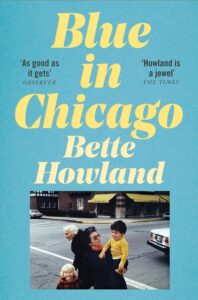 BLUE IN CHICAGO – BETTE HOWLAND (1978)
BLUE IN CHICAGO – BETTE HOWLAND (1978)
“Chicago isn’t a city. Just the raw materials for a city.”
Howland’s second book (following 1974’s W-3, a memoir about her attempted suicide and subsequent spell in a psychiatric facility) is a sharply observed collection of autobiographical stories about a working class Jewish family in Chicago. Her world is dilapidated, but not grim; compassionate, but not sentimental; angry, but not cold-hearted. It brims with vitality, and is told in her own off-beat cadence, which might wrongfoot you, but is always honest.
Howland was well-received critically on publication, and was awarded a MacArthur Fellowship – the so-called “Genius Grant” – in 1984, a year after her third book, Things to Come and Go, a triptych of long stories. She never published again; praise is nothing in the face of expectation. In recent years she has been rediscovered to some minor fanfare, and Picador have published gorgeous new editions of her books. Buy them, please.
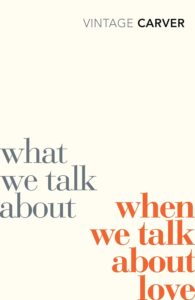 WHAT WE TALK ABOUT WHEN WE TALK ABOUT LOVE – RAYMOND CARVER (1981)
WHAT WE TALK ABOUT WHEN WE TALK ABOUT LOVE – RAYMOND CARVER (1981)
“A man without hands came to the door to sell me a photograph of my house.”
A family friend, a librarian, gifted me my first volume of Carver’s stories for my eighteenth birthday. For the first time, I became consumed not by what a writer was saying, but how they were saying it. Carver’s brief, pared down stories of working class purgatory are elliptical. Precarious. His silences have sharp edges. His characters live in fear and expectation. Of what exactly, on either count, they are unsure, other than the certainty it will be a catastrophe. Marriage, infidelity, financial woes, the lethally quiet domestication of bad intentions; sleights of the human heart by which we change out of our own sight. A gallery of blue collar characters sketched in potent prose you catch just out of the corner of your eye. Plant workers and waitresses haunting depressed towns in the death rattle of industry. Travelling salesmen with no place to go and nothing to sell. Good people, surely, doing the best they can. Like all of us, none of them are getting out alive.
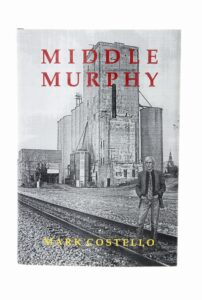 MIDDLE MURPHY – MARK COSTELLO (1991)
MIDDLE MURPHY – MARK COSTELLO (1991)
“I can neither excuse nor blame my father. I can do nothing, it seems, but resemble him.”
A writer who loved words, who wielded language bizarrely, Costello couched comedy in despair. Seventeen years after his debut, Murphy Stories, he returned with another collection of connected stories about his eponymous working class protagonist from Decatur, Illinois. The tales almost cohere novelistically, are perhaps something more than a collection but not quite a novel. They require the space between them that the shorter form grants. “My aesthetics when it comes to writing are novels that read like short stories, short stories that read like poems, and poems that read like prayers.” I would say he was a writer’s writer, but he’s so woefully underread even by his published peers that he was more like a writer’s writer’s writer. Joy Williams passed Costello’s work to Gary Fisketjon in the 1980s, but the editor showed no interest. Tastemakers often lack requisite taste. Costello remained obscure until his death, and now beyond it. His books have never been reprinted, but old University of Illinois editions can be spotted by eagle-eyed hunters. Go find them.
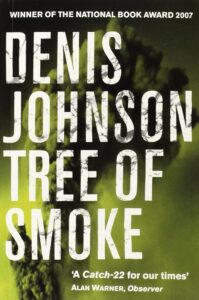 TREE OF SMOKE – DENIS JOHNSON (2007)
TREE OF SMOKE – DENIS JOHNSON (2007)
“Ninety percent of what goes through my mind on a daily basis is against the law.”
Given he’s a writer much admired for thin, chiselled classics such as Jesus’ Son and Train Dreams, Denis Johnson really went on safari without a hat when he gave us Tree of Smoke, a 600+ page whacked-out hallucinogenic leviathan that lurches through various mishaps of American intelligence in Vietnam, the land and its invaders drawn in a perpetual state of delusional madness. A big novel in all ways – size, ambition, theme, span – it moves at a pace that belies its tombstone heft.
“I don’t have much interest whether any of my books work or not,” Johnson said, in an interview shortly after Tree of Smoke won the National Book Award. He took risks, he put himself and his writing in the path of hazard, and that’s surely the way to do it. Anyone can do it the other way.
I’ve long hoped that Dom would take on the role of my guest curator as I knew he would recommend some titles I’d not previously encountered. As it turns out he recommended five books I’ve not read and I genuinely want to read all five. But they will have to wait as I am clearing the decks for White City. My sincerest thanks to Mr Nolan for expanding the Decades Library with these wonderful sounding books.


